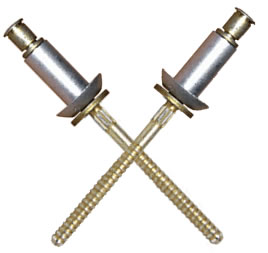
Rivets are available in many different materials. In addition to aluminum and steel, titanium is a common material in which they are made. Featuring the atomic number 22, titanium is a silvery chemical element that’s found in Earth’s crust. It exhibits several characteristics that make it a popular choice for aerospace rivets. What are the benefits of titanium rivets exactly?
High Strength-to-Weight Ratio
Titanium rivets have one of the highest strength-to-weight ratios. This metric represents the strength of a rivet relative to its weight. Titanium rivets are about as strong as steel rivets but are 45% lighter. As a result, titanium rivets have a much higher strength-to-weight ratio than their steel counterparts.
The lightweight properties of titanium rivets make them particularly useful for aerospace applications. Airplanes, of course, are meticulously designed as light as possible without compromising performance or safety. Heavy airplanes require bigger engines and consume more fuel than lighter airplanes. Titanium rivets allow airplanes to maintain a low weight thanks to their high strength-to-weight ratio.
Resistant to Corrosion and Oxidation
Titanium rivets are resistant to corrosion and oxidation. Fasteners, of course, can oxidize and corrode when exposed to moisture vapor. Over time, regular exposure to moisture vapor can cause a chemical reaction that converts some of the iron molecules in a fastener into iron oxide.
Titanium rivets, however, are protected from corrosion and oxidation such as this. When exposed to moisture vapor or oxygen, they will develop a natural oxide layer that protects them from corrosion.
Long-Lasting
It’s also worth mentioning that titanium rivets are long-lasting. Aircraft maintenance and repairs can be expensive. Titanium rivets, though, often last longer than many other types of fasteners. They are resistant to corrosion and oxidation, and they don’t succumb to premature wear and tear. As a result, they last a long time,
Heat-Resistant
Another benefit of titanium rivets is heat-resistance. Titanium can withstand extremely hot temperatures of up to 1,600 degrees Fahrenheit without degrading. Therefore, titanium rivets are often preferred when fastening parts near hot aerospace components, such as engines and exhaust systems. While the heat of these components may damage other types of rivets, titanium rivets can withstand this heat.
Minimal Thermal Expansion and Contraction
Finally, titanium rivets exhibit minimal thermal expansion and contraction. In other words, they don’t expand or contact as much as other types of rivets when their temperature changes. This ensures a high level of stability, which is crucial for aerospace-related fastening applications.



